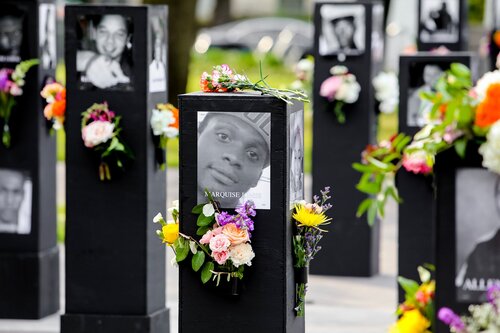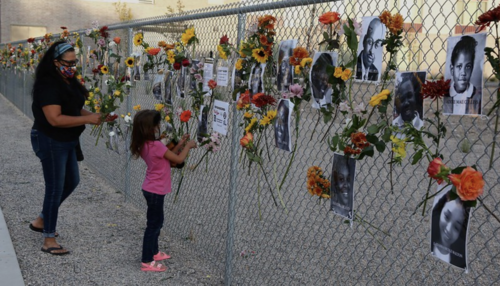
A Say Their Names Memorial in Houston, Texas
Credit: Doogie Roux on SayTheirNamesMemorials.com
When wars and natural disasters leave hundreds dead in their wake, we erect mass memorials to honor the lives we’ve lost. There are memorials for those who’ve had cancer or died in freak accidents. But what about those who have lost their lives to racial injustice?
The Say Their Names Memorial project creates memorial installations to honor the Black men, women and children who have died as a result of systemic racism throughout our country’s history. The project was started by Joy and Elise Proctor this year in Portland, Oregon, and quickly spread across the nation. Families and community members can submit photos and text commemorating lost loved ones, which are then added to the project’s website.
Say Their Names Memorial also helps communities create physical memorials in their neighborhoods by sharing files from its database, making it easy for remote participants to print out photos and descriptions. Since the first memorial was created in Portland on Juneteenth this year, Say Their Names memorials have gone up in 25 locations across the U.S. These memorials feature black-and-white photos of those who have died, often adorned with handmade art and floral arrangements.

A child adds flowers to a Say Their Names Memorial in Salt Lake City, Utah.
Credit: Robin Pendergast on SayTheirNamesMemorials.com
In 2021, the project plans to go on tour with a traveling memorial. The memorial, which will feature 36 columns displaying the information of people who have died, will set up in communities across the country. Each location that hosts the memorial will be required to offer voter registration and to host a town hall on systemic racism.
In an interview on “Up with India,” Say Their Names Memorial founder Joy Proctor told India Sage that she created the first memorial in Portland in the hopes of sustaining momentum during protests against police brutality. “In Portland, we showed up every day. Every day, there were multiple protests here. But I was so worried that the movement would slow down as time went on, so I thought, ‘If I create a memorial that’s on the protest line, maybe people will see it and remember — it’s not only about the names you know and that you’re repeating, it’s about the names you don’t remember, and there are far too many of them.’”
Proctor works as an editorial designer and wedding planner, and she created the Portland memorial using flowers supplied by a florist friend after COVID-19 resulted in a season of cancelled weddings. Though she wasn’t able to install the memorial directly on the protest line, she eventually located it on a nearby fence, which soon became “a place where anybody who wanted to be part of the movement could go, and they knew that at any time of the day, they’d find a like-minded soul.”
Remembering our loved ones is an important part of honoring life and death. But grieving isn’t just the work of a family; it’s the work of a community. While there’s a vast difference between losing a friend or family member and seeing a face on the news, it serves our humanity to grieve together and to support each other in that grief.

 Say Their Names Memorial Honors Lives Lost to Racial Injustice
Say Their Names Memorial Honors Lives Lost to Racial Injustice


 National Donate Life Month Reminds Us To Give
National Donate Life Month Reminds Us To Give
 How Dare You Die Now!
How Dare You Die Now!















